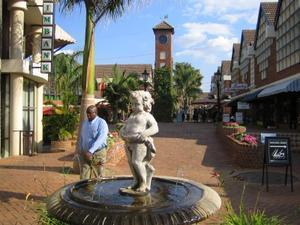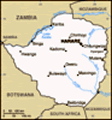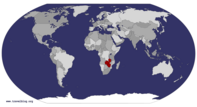Advertisement
Published: July 20th 2005

 Africa?
Africa?
Parts of Harare reminded me more of London then anything I had stereotyped as being in AfricaSo, I'm still here in Zim, drinking a hot cup of tea because the African winter is just settling in and believe it or not, it’s cold enough that I can see my breath in the mornings. I remain in exile from under the information that my Zambian work permit "should be ready tomorrow". However this is the exact same information that I was told when I was deported so I am now defining the term "tomorrow" as being sometime between now and when I have to return to Canada around Christmas time. But, being given the chance to experience life here in Harare during what could be seen as a "crisis" time. Crisis being a very relative term because the situation has moved from horrible to unbearable as seen through the lens’s of many local independent newspapers, but seen as just another day in Harare by many of the local residents who have been through so much already that whatever problems come up, they are just more problems to the already exhaustive list. Either way you look at it, I thought I would share some of the interesting aspects of my life here seen through my lens.
I've visited

 Look at all the Sweet Tooths
Look at all the Sweet Tooths
Believe it or not, this line up for sugar goes around the corner and down 3 more blocks....and hasn't moved in an hourquite a few capital cities in some of the very poor countries that I’ve traveled in, and in each one there are always your few rich neighborhoods. There is always an area or two where the high-end politicians, the rich bankers and the savvy business men put up hugely lavish homes in spotless manicured communities away from the massive amount of impoverished poor people throughout the rest of the city. The difference here is that in Harare, these communities and homes take up at least half of the cities physical area. At first sight you are amazed at the amount of wealth in the city. When arriving here, I was blown away after driving through community after community after community of these very high end homes and communities. With the mixture of landscapes, it was like I was more in a hybrid-city between London and Vancouver, not Lusaka and Lagos. My Zimbabwean friend and I decided to sneak into the Nick Price designed golf resort communities of Bonnyville and FolyJohn. Again, it was more like driving through a Hollywood tour of movie-star houses then any slum infested perceptions of “Africa” that I had coming into the city. I was even

 Very typical Hararean House
Very typical Hararean House
I'd say this house is quite typical for many people living in Harareable to catch a glimpse of "Bob's House" (The residential home of 25-year dictatorial President Robert Mugabe’s, which is more like an Asian Palace then any sort of house). I kept asking myself whether the listing of the date on the newspaper on my lap was a misprint or not, considering the headline read "Harare, a city in crisis" and the date was today’s.
One illustrative and ironic situation that I encountered yesterday was when I was walking downtown through one of the very posh pedestrian avenues in the middle of the city. There were easily thousands of shoppers going through and purchasing Rolex watches, Nike running shoes and Jean Patou perfumes. I felt like I was in the middle of the Champs Elysees in Paris. Right next to one of these posh department stores was a huge lineup of easily a few hundred people. I thought there might be some big release for a new facial cream or flat screen TV. I walked over to the some of the people in the lineup, most of them sporting Rolex’s and Nike's themselves and asked what the line up was for. "Sugar" was the reply..........Sugar??? Man did I wish I had a couple stalks of Zambian sugar cane which I could buy for less then 10 cents back in Choma. Maybe I could have cut a deal with someone to help me replace my stolen laptop. Another similar situation occurred a little later on in the day while buying some juice in the shopping market. Only 5 meters to my left of the checkout, I witnessed a huge fight between a mob of people and the stores security guards. Men were throwing punches, ladies were screaming at management, all over what seemingly was the last bag of sugar in the store. I wasn't even able to get a clear answer over what the cost of that bag would be, but I was told that it was 6 times the price of what it was a three months ago, helping me understand what they meant by a 400% inflation rate.
I think one of the best ways I've seen the situation here illustrated was in a cartoon in one of the daily newspapers (an independent one of course). There is a man who was pushing a wheel-barrow full of money down the street and two thugs have decided to rob him. The man pushing the money accepts his fate and starts to scoop the money out of the wheel-barrow and hand it over to the thugs. However, the thugs instruct him to drop the money on the ground and keep shoveling it out because they are more interested in stealing the wheel-barrow then all the "useless paper" inside of it.
Looking a little deeper, you start to see more evidence of this "crisis". None of the gas stations post fuel prices and there are dozens of cars lined up outside most of the stations. The reason is because those stations don't even have any fuel to give, they are just waiting and hoping that a fuel tanker from South Africa will come to the station sometime today so that they can remain open for another day. Driving through the huge amounts of industrial infrastructure in the town gives you the impression that manufacturing industry in booming, that is until you notice that there are no fumes coming out of any of the smoke stacks. I am told that almost every major company in town has closed their doors and unemployment in the city is up to 80%.
After still not believing all of the headlines that I had read, I decided to do what I usually like to do in any new city I visit, I decided to get myself lost. I found my way out of the lavish condos and poolside villas through the downtown core and out into the compound shanty-town community of Mbare. I walked into an area with a number of 5-story apartment hostel style buildings which seemed at first as if they should have been abandoned as many of the walls were crumbling and looked ready to collapse at any moment. My mind didn’t seem to accept that all the chaotic yelling and banging and dirty laundry hanging out of the windows was sufficient evidence for human civilization.
I ended up being approached by a lady carrying a large 15-liter plastic container of water on her head. She introduced herself as “Liz or if I preferred Queen Elizabeth for short”, followed by her breaking out hysterically into laughter at her clever pun-y-ness. We started chatting and she broke my stubborn disbelief about human occupancy by showing me her home inside one of these places. Inside, I very generously concluded that there was probably room for maybe 5-6 people to live using my typical African cramped conditions mental calculator (which equates to a Canadian space equivalent of a tight fit for 2), she informed me that there was now 20 people currently living there! The water had not been on for over three months and she had to walk to a far away borehole 45 minutes away to get any (of which I took a glimpse of the contents of her container and concluded it looked more like chocolate milk then water). Apart from no water; the electricity, sewage and garbage pick-up had also completely disappeared in recent months.
After meeting Liz, I started to accept more and more about what the newspapers have been reporting about. But I had to ask myself how do situations like this happen in what used to be the bread basket of and one of the wealthiest cities in all of Africa? Well, as I’ve always learnt since being here, there are always plenty of complex reasons.
The huge agricultural land reforms where President Mugabe kicked out most of the white commercial farmers and “more equitably redistributed” their land to local Zimbabweans (read: his political cronies) is obviously one of them. This led to huge political and economic sanctions being placed on Zimbabwe by the outside world and caused the majority of foreign investors to pull all their money out of the country. Other reasons aren’t quite as blatant but still contribute all the same. When things started getting really bad in Harare in 2002, the people elected a mayor of the opposition MDC party in hopes that he would be able to turn things around. But late last year the mayor was thrown out of office by the central government and replaced by Mugabe’s ruling elite who have now tried to take everything over. But these people now in charge have very little experience in running a city. Supposedly, the raw sewage has built up so much that it is now spilling over into the cities main water drinking source. The cities main water company, as with most of it’s other utilities, is currently being run by a government administrator with a teaching background. This is because most of the experts and engineers have resigned and left the country due to getting pissed off with all the central government intervention.
Even most of the international donors and NGO's are pulling out of the country either out of political protest or being thrown out by Mugabe. My NGO, IDE, has only been able to stay in the country by claiming that they aren't doing development work but "long-term relief" instead. And, most of the relief in the country is only allowed to be distributed to the areas of the country that have supported the ruling Zanu FP party. The second biggest city in Zimbabwe, Bulawayo, which also has had an opposition party member elected, has been prevented from borrowing any money to help maintain the city and food relief from outside organizations has been banned. According to the mayor, for most in Bulawayo, this can lead to nothing less then mass starvation.
But this again is an update as seen through my outsiders lens and therefore this account seems to be more extreme and emergent then what most Zimbabweans would ever write. And despite the majority of Zimbabweans living in all various levels of abject poverty, I’m staying with two guys from my NGO and living quite comfortably. Of course my NGO is being paid in foreign currency so things are always going to be peachy. We have plenty of fuel, food and fresh water. But now where the hell are we going to find sugar for our tea?
Advertisement
Tot: 0.055s; Tpl: 0.012s; cc: 7; qc: 24; dbt: 0.0348s; 1; m:domysql w:travelblog (10.17.0.13); sld: 1;
; mem: 1.1mb








